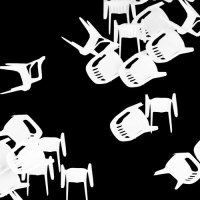Don't worry. Alternate actions will not happen. We will open the menu, consider the dinners that we can order, and choose the single thing that we inevitably would order under these circumstances.
Saying ''will not happen'' just doesn't help establish compatibilism. If not determined, of course it 'will not happen.'
Confirming that it will not happen establishes determinism. Keep in mind that a compatibilist must establish both determinism and free will. So, I am simply pointing out that determinism is not actually violated as we consider our possibilities and make our choices. The single inevitable chain of events is constant throughout the process of choosing.
It will not happen because, given the terms of determinism, what 'will not happen' cannot happen.
Saying that "what will not happen cannot happen" is the logical error that results in a paradox. "Can" constrains "will", because if it cannot happen then it will not happen. But "will" does not constrain "can", because what we "can" do is only limited by our physical ability to carry out that option if we choose to do so. There is nothing on the restaurant menu that we "cannot" order. But there are plenty of items that we "will not" order.
The ability to order the Steak means we "can" order it. But, because of the bacon and eggs for breakfast and the double cheeseburger for lunch, we "will not" order it, even though we "can" order it. And in the past tense, we "would not have" ordered it even though we "could have" ordered it.
Within the human brain, the only way to get to the single thing that we "will" choose is to first identify the multiple things that we "can" choose. If we attempt to limit what we "can" choose to what we "will" choose, we end up in a paradox:
Waiter: "What will you have for dinner tonight?"
Diner: "I don't know. What are my possibilities?"
Waiter: "Because of determinism, there is only one thing that you can order, which is the same thing that you will order."
Diner: "How do I choose what I will order if I don't know what I can order?"
Waiter: "I don't know. But I'm here to take your order once you figure it out."
This is the problem that you present to the human mind when suggesting that "what will not happen cannot happen". It ends up trapped in a paradox.
If we are talking about determinism - if something is not determined to happen, it will not happen, it won't happen,
And that is where we must stop. That is sufficient for determinism. Going on to say that "it cannot happen" runs head on into the paradox.
No matter how much you want it to happen, wish it to happen, desire it to happen, work toward making it happen, if not determined, it will not happen.
In the real world, wanting something to happen and working toward making it happen, are the causal mechanism that determines that it will happen.
It will not happen because if it could, it would contradict the terms and conditions of the system as you define them to be.
You are forgetting that the wanting and the working were also causally necessary from any prior point in time. So, there is no contradiction to the requirements of determinism. The "wanting something to happen" and the "working to make it happen" are just normal events that show up in the causal chain, just like any other deterministic event!
You can and will do precisely what is determined by the system, the circumstance, your own makeup and proclivities in the moment of action in that time and place.
Am I not part of the system? Am I not also part of the circumstances? Are not my own makeup and proclivities integral parts of me? And was it not my own choices at breakfast (bacon and eggs) and lunch (double cheeseburger) that caused me to choose the Chef Salad for dinner? The notion that there is some "system" external to me that is determining what I will do is superstitious nonsense.
Not only must these events take place as determined, nothing can prevent or alter what happens as determined.
It doesn't bother me, that my choice was causally inevitable from any prior point in the past, as long as I know that it was actually me making the choice. And I made that choice myself, free of any coercion or undue influence, so it was a freely chosen "I will have the Chef Salad, please".
Compatibilism has a firm footing. Determinism holds, because what will inevitably happen inevitably happens. Free will holds because whenever we open the menu, consider the dinners that we can order, and choose the single thing that we inevitably would order under these circumstances, it is accomplished while free of coercion and undue influence.
It's that simple.
Compatibilism, as with many belief systems, has its following. There are also incompatibilists, those who see that the notion of free will is incompatible with determinism. Nor indeterminism, for that matter.
I find it simpler to presume a world of perfectly reliable cause and effect, and to assume any event is reliably caused, even if we have no clue as to what that cause might be. I assume that any apparent "indeterminism" is a problem of prediction, rather than causation. But the fact that we cannot determine the cause is insufficient reason to presume there is no cause.
The personal narrative/information acting upon the brain;
''For example, in one study, researchers recorded the brain activity of participants when they raised their arm intentionally, when it was lifted by a pulley, and when it moved in response to a hypnotic suggestion that it was being lifted by a pulley.
Similar areas of the brain were active during the involuntary and the suggested “alien” movement, while brain activity for the intentional action was different. So, hypnotic suggestion can be seen as a means of communicating an idea or belief that, when accepted, has the power to alter a person’s perceptions or behaviour.''
''All this may leave one wondering where our thoughts, emotions and perceptions actually come from. We argue that the contents of consciousness are a subset of the experiences, emotions, thoughts and beliefs that are generated by non-conscious processes within our brains.
This subset takes the form of a personal narrative, which is constantly being updated. The personal narrative exists in parallel with our personal awareness, but the latter has no influence over the former.''
Neuroscience confirms that a primary function of the human brain is decision making. Choosing is really happening and our brains are really doing it. We are not aware of our non-conscious processes as they build our conscious experience. After all, that's what "non-conscious" means. Neuroscience also demonstrates that our conscious experience can be manipulated by transcranial magnetic stimulation and hypnotic suggestion. In the experimental laboratory, a person may volunteer, of their own free will, to be subjects of these experiments which demonstrate ways to influence what happens in the brain.
Besides decision making, another function of the brain is what Michael Gazzaniga calls the "interpreter function". It has the task of explaining to itself and others what the we are doing and why. Normally, it has sufficient information to do a pretty good job of this. But a person can be manipulated by hypnotic suggestion to perform some act, like taking off his shoe when he hears the word "hippopotamus", and then told to forget the suggestion. After he wakes up, someone will say the word and he'll remove his shoe, but he won't know why. The interpreter, left to explain this unexplainable event, will confabulate a story to try to make sense of it. "I thought I felt a pebble in my shoe", he may say.
Normally, though, outside the laboratory, our brains can give an accurate description of why we did something. For example, in the restaurant, knowing that we had bacon and eggs for breakfast and a double cheeseburger for lunch, we knew exactly why we chose the Chef Salad when we could have had the Steak.



